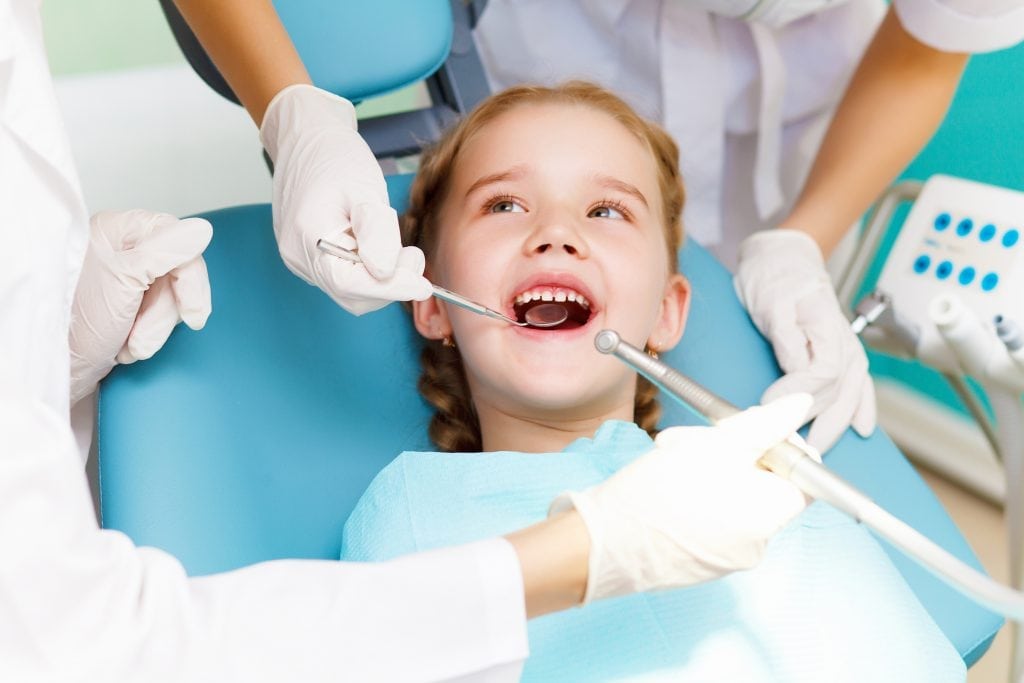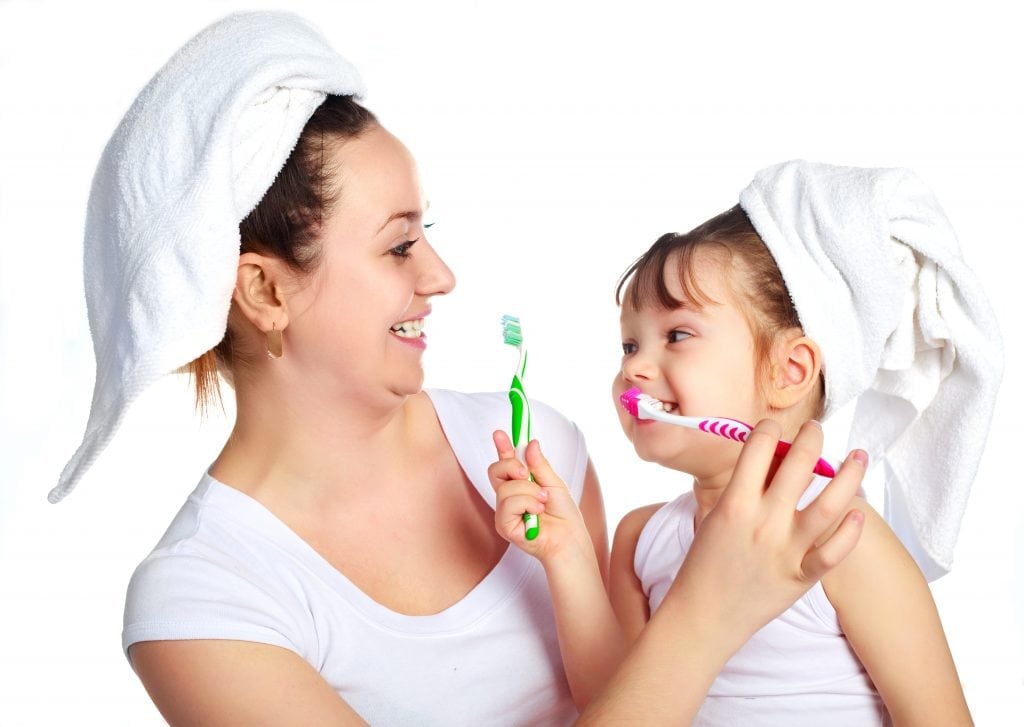
We understand the early years are often an incredibly busy time and you may not start thinking about the dentist until your child has a full set of teeth, but children’s dental care starts long before it’s time to see the dentist.
Oral health for babies
You can begin to familiarise your baby with mouth cleaning long before any teeth erupt. After feeding, we recommend using a damp cloth wrapped around your finger to gently wipe over your babies gums. This will help when you transition to a soft brush later on and will also ensure your baby’s mouth remains clear of any milk residue.
Which baby teeth come in first?

Teething can be a dreaded time for parents. It can be difficult to see your child in discomfort and pain may lead to trouble sleeping and feeding. Teething can begin as early as 4 months; however, it most commonly commences around 6 months of age. Generally, teeth come in pairs with the bottom two at the front appearing first followed by the two front teeth on the top. For more information on the eruption sequence, have a look at our resources and activities page here.
What is baby bottle decay?
Many parents would be surprised to find that babies as young as 6 months are at risk of tooth decay. When babies fall asleep suckling milk, it can pool in their mouths over their baby teeth. Bacteria in your baby’s mouth can then turn the sugars found naturally in milk into acid eating away enamel and leading to cavities. If decay begins in the teeth of very young children, early diagnosis is important which is why dentists recommend having their first visit before the age of two years.
To reduce this occurring try to limit sending your child to bed with a bottle and practice wiping down gums with a cloth and brushing teeth with a soft bristled infant toothbrush.
Toothbrush for babies
You can transition to a soft baby brush around the time your baby will start to grow their first tooth. It’s important to choose a brush specifically made for babies with soft bristles and a small head ideal for gums and small teeth. Most toothbrush companies will have a variety of sizes and styles available so be sure you choose carefully to avoid harming your baby’s gums with hard bristles.
When can toddlers use toothpaste?
When your baby reaches 18months you can add a small smear of children’s toothpaste to the toothbrush. Before this age only use water with your baby toothbrush as they will not be able to spit out the toothpaste.
We recommend using an infant toothpaste without fluoride for the first few months of brushing. After your toddler’s first dental appointment we will recommend when the right time to switch to a children’s dose fluoride toothpaste.
When should I take my toddler to the dentist?

There is often a big misconception around visiting the dentist; parents often think the first time should coincide with their child’s first year of schooling or even later once all their baby teeth have fallen out. This is not true and could be detrimental to your child’s teeth development.
We recommend bringing in your toddler around the age of 2 so they can begin to establish a good relationship with the dentist from an early age as well as give us an opportunity to assess the growth and development of your child’s baby teeth. Baby teeth provide a good foundation for adult teeth, so even though they will eventually fall out it is extremely important to maintain optimum oral health for baby teeth.
Going to the dentist for the first time
While you may be apprehensive about the dentist yourself, it’s important to remain calm and portray to your child that the dentist is a safe and comfortable environment. The first appointment will be very casual and low key and most likely involve trying out the dentist chair and a quick look at your child’s smile. It doesn’t have to be long and there won’t be any scary sounds or appliances near your child’s mouth. At Crookes and Jenkins Dental, we are a family dental practice and love seeing children on their first visit. We try and make the whole process as enjoyable as possible and always compliment each of our little patients on their beautiful smiles.
During this visit is a good time to bring up any concerns or questions you may have concerning your child’s development. The dentist can be a good source of resources and information on keeping little teeth healthy and our dental hygienists are always on hand to show you proper techniques and tips for at-home care.
How often should a child brush their teeth?

Children’s teeth need the same care as adult teeth. We recommend brushing twice a day, once in the morning and once again at night just before bed. You should brush your child’s teeth until they have the dexterity to brush for themselves. A good guide is around the same time they can tie their shoelaces. Spend about 2 minutes brushing in circular motions, being careful to brush each side of the tooth and making sure to spend time on the molars as this is where a lot of decay occurs in children.
Replace the toothbrush every 3-4 months and after your child is sick as this is the best way to get rid of any bacteria present in the brush.
What age should you start flossing your teeth?
Once your child’s teeth begin to fit together closely they will need to start flossing. This usually occurs between the ages of 2 and 6 depending on the child. You can always ask your dentist at Crookes and Jenkins Dental during your child’s appointment if you are unsure when the best time to start is. Flossing can be tricky, especially for little hands, so we recommend helping them until around the age of 10.
At what age do baby teeth normally fall out?
A lot of parents worry that their child’s teeth are not falling out on time. However, the timing is not really the important thing rather the pattern that they fall out in. In general, between the age of 6 and 8 children will lose their first 8 baby teeth including their front teeth. There will often be a break between the age of 8 and 10 where not much happens and then children will lose their remaining 12 baby teeth between 10 and 13. However, it isn’t uncommon to see 10 year-olds with no baby teeth remaining or in contrast 14 year-olds still waiting to lose a few.
If there is a considerable time (3 months or longer) between your child losing a tooth and the replacement growing in, there may be a problem and it would be a good idea to contact their dentist.
As always, if you have any concerns about the development of your child’s teeth come in for an appointment at Crookes and Jenkins Dental. Every child is different and as such their tooth development will look different to their siblings and friends.
How often should children see a dentist?
For some reason there are often misunderstandings surrounding the care of children’s teeth, thinking that because baby teeth fall out they are somehow not as important as adult teeth. We cannot stress enough how important it is for your children to see their dentist the recommended twice a year. Baby teeth provide the foundation for adult teeth and problems corrected early on can often prevent further problems later in life.
Oral health for children
Maintaining optimum oral health in children covers three areas. Firstly, at home care is very important in promoting strong and healthy teeth as well as preventing decay. Secondly, seeing the dentist regularly will allow any problems to be picked up and corrected early on as well as provide a professional clean – getting rid of the build-up that toothbrushes alone cannot remove. The last area that affects the health of your child’s mouth and teeth is their diet. It is commonly known that sugary foods and drinks can lead to decay and are to be limited but many parents are unaware of the health benefits of certain foods for keeping teeth strong. Foods containing dairy and crunchy vegetables such as carrots should be a staple in your child’s diet. For more information and healthy tooth tips, visit our tips page here.
Children’s dentistry at Crookes and Jenkins Dental
We are proudly a family dentist treating patients young and old. If you are looking for a friendly, gentle dentist for your child consider calling the team at Crookes and Jenkins Dental. Our team is highly qualified, compassionate and patient focused. We understand the specific needs of children and treat them with the care and patience they deserve.
